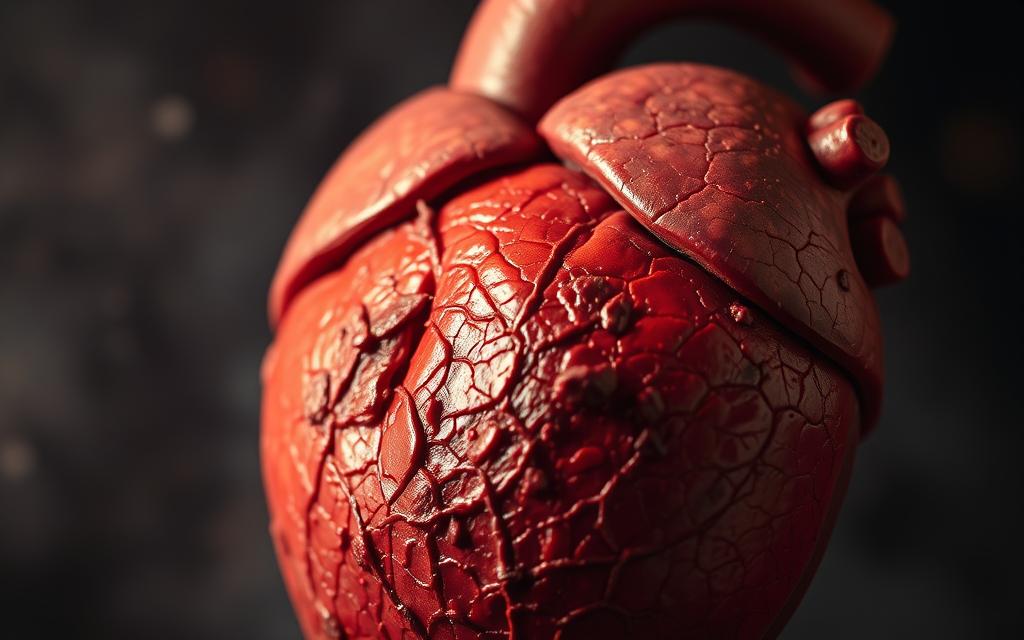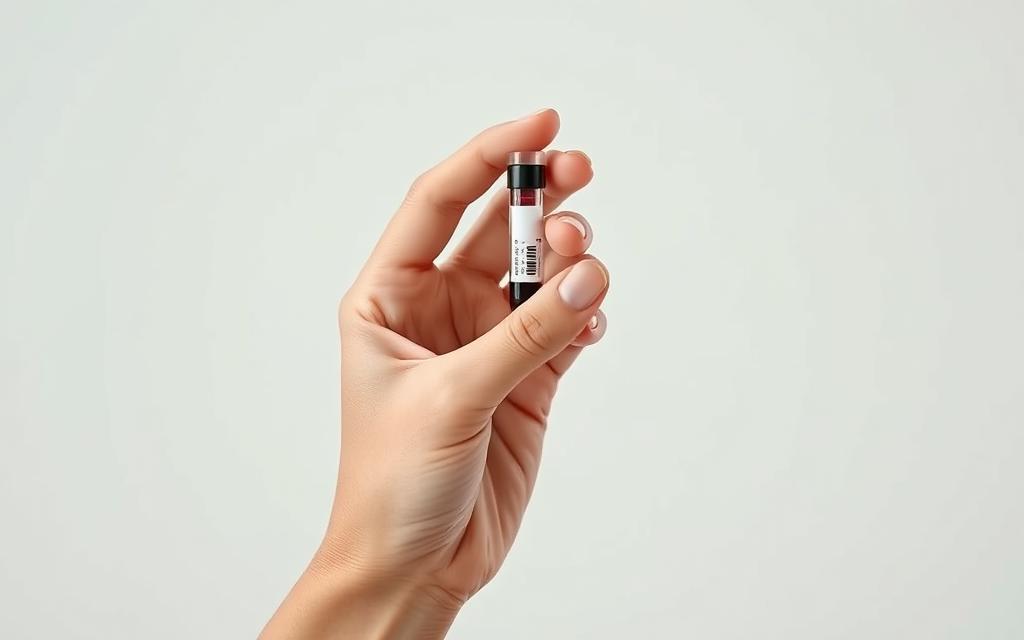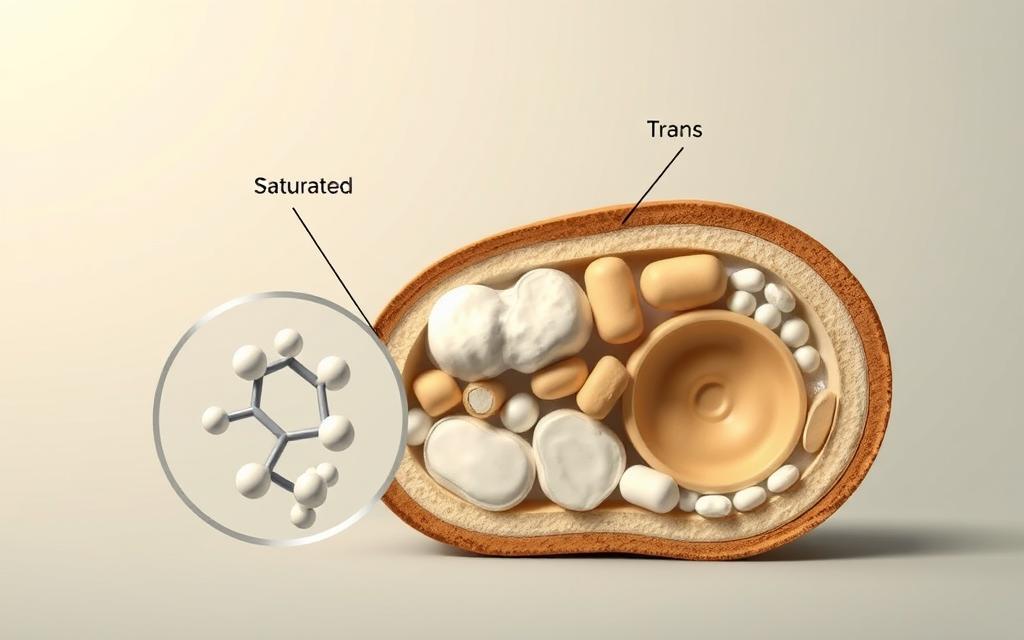Have you ever had a moment when you realized something was off with your health? Maybe it was during a routine check-up when your doctor mentioned high cholesterol. This term can make you feel scared and unsure.
But, managing cholesterol levels is more than just avoiding medication. It’s about taking control of your health through knowledge and lifestyle changes. By making heart-healthy choices and adding cholesterol-lowering foods to your diet, you can greatly reduce the risks of high cholesterol. Let’s explore how to take this journey together and find the best ways to keep your heart healthy.
Key Takeaways
- Understanding cholesterol is key to managing levels.
- High cholesterol can lead to serious health issues.
- Heart-healthy foods play a crucial role in lowering cholesterol.
- Incorporating lifestyle changes can significantly improve cholesterol levels.
- Regular monitoring is essential for maintaining optimum health.
Understanding Cholesterol and Its Types
Cholesterol is a waxy substance in your blood that helps build healthy cells. This cholesterol definition shows its importance for health. But, too much cholesterol can raise heart disease risk. Knowing the two main types of cholesterol is key to heart health.
Low-Density Lipoprotein (LDL) cholesterol is called “bad” cholesterol. High LDL levels can cause plaque buildup in arteries. This narrows blood vessels and raises the risk of heart attack and stroke.
On the other hand, High-Density Lipoprotein (HDL) cholesterol is “good” cholesterol. HDL cholesterol carries cholesterol away from arteries to the liver. There, it’s processed and removed from the body. This shows why keeping cholesterol levels balanced is crucial.
Why High Cholesterol Matters
High cholesterol is a big health problem in the United States. It affects millions of people. High levels of LDL cholesterol increase the risk of heart disease.
Too much LDL cholesterol can cause atherosclerosis. This is when plaque builds up in arteries. It narrows blood vessels and can lead to heart attacks and strokes.
It’s important to check cholesterol levels often. This helps catch high cholesterol early. It makes it easier to make lifestyle changes or get medical help.
Knowing about high cholesterol is key to avoiding heart disease. It helps keep you healthy for a long time.

Cholesterol Levels: What You Need to Know
Knowing your cholesterol levels is key to understanding your heart health. A cholesterol test shows your total cholesterol, LDL, HDL, and triglycerides. Each one is important for your overall health. A total cholesterol level under 200 mg/dL is good, showing less risk for heart disease.

Getting regular cholesterol tests is crucial for your heart. This is even more important if you have diabetes, obesity, or a family history of heart disease. Finding high cholesterol early can help you make changes to lower your heart disease risk.
By watching your cholesterol levels and following testing guidelines, you can help keep your heart healthy. Taking care of your cholesterol can greatly improve your long-term health.
Heart-Healthy Foods to Lower Cholesterol
Eating heart-healthy foods every day can really help your cholesterol levels. A low cholesterol diet includes many foods full of nutrients. For example, fatty fish like salmon and mackerel are great for your heart. They have omega-3 fatty acids that help lower bad cholesterol.
Whole grains are also key in a low cholesterol diet. Foods like oats and barley have soluble fiber. This fiber is great for keeping cholesterol levels balanced. Nuts and seeds, like almonds and flaxseeds, add healthy fats and fiber. They’re tasty and good for you.
Fruits and vegetables are essential in your diet. They’re full of antioxidants, vitamins, and minerals that boost your health. Eating a variety of colorful fruits and veggies gives you lots of nutrients. They’re perfect cholesterol lowering foods.

Planning your meals with these heart-healthy foods can bring lasting benefits. Choosing a variety of these foods regularly makes your diet healthier. It supports a strong heart and overall wellness.
Reducing Saturated and Trans Fats
Managing cholesterol levels starts with what we eat, focusing on saturated and trans fats. Saturated fats are in red meat, butter, and full-fat dairy. These fats can raise LDL cholesterol, known as “bad” cholesterol.
Trans fats, found in processed and fried foods, are worse for cholesterol. They increase bad cholesterol and lower good HDL cholesterol.
To improve heart health, we should choose healthier fats. Olive oil, avocado oil, and nuts are good alternatives. They can replace harmful fats in our diet.

Incorporating Omega-3 Fatty Acids
Adding omega-3 fatty acids to your diet can greatly improve heart health. They help lower triglycerides and boost HDL cholesterol. Salmon, mackerel, and herring are great sources of these fats. They are not only good for you but also taste great as cholesterol lowering foods.
Plant-based foods like walnuts and flaxseeds also contain omega-3s. This means vegetarians and vegans can enjoy these benefits too. Eating a variety of these foods can lead to better cholesterol levels and heart health.

Try to eat foods rich in omega-3s a few times a week. This small change can make a big difference in your cholesterol levels. It’s a step towards a healthier lifestyle.
The Role of Soluble Fiber in Lowering Cholesterol
Soluble fiber is key in managing cholesterol. It helps reduce how much cholesterol is absorbed into the blood. This fiber forms a gel in the gut, which traps cholesterol and helps remove it from the body. This leads to better cholesterol levels.
Eating foods high in soluble fiber can lower LDL cholesterol, or “bad” cholesterol. Good sources include:
- Oatmeal
- Kidney beans
- Lentils
- Apples
- Pears
A diet rich in soluble fiber is good for the heart and overall health. Eating these fiber-rich foods regularly can bring long-term benefits. It’s great for those trying to manage their cholesterol effectively.

Whey Protein: A Natural Cholesterol Reducer
Whey protein comes from cheese making and is good for heart health. Adding it to your diet can lower LDL cholesterol. Studies show it can also cut down total cholesterol and blood pressure.
Whey protein is popular for its health perks. It helps control cholesterol and gives important amino acids for muscle repair. This makes it a key part of a healthy diet for the heart.
Using whey protein can boost heart health when combined with other foods that lower cholesterol. A diet rich in whey protein supports better heart health.
Exercise: A Key Factor in Managing Cholesterol
Regular exercise is key to managing cholesterol levels. It leads to many health benefits, like better heart health. People who exercise often see their HDL (good) cholesterol go up and their LDL (bad) cholesterol and triglycerides go down.
To get the best results, try to do at least 150 minutes of moderate-intensity aerobic activity each week. This can include:
- Brisk walking
- Swimming
- Cycling
These activities boost your heart health and help with weight management. Both are important for keeping cholesterol levels healthy. Here’s a simple overview of the effects of different types of exercise on cholesterol:
| Type of Exercise | Effect on HDL | Effect on LDL |
|---|---|---|
| Aerobic Activities | Increase | Decrease |
| Strength Training | Moderate Increase | No Significant Change |
| High-Intensity Interval Training (HIIT) | Significant Increase | Decrease |
Mixing up your exercises keeps things interesting and boosts health benefits. With regular exercise, managing cholesterol levels becomes easier.

Quitting Smoking and Its Benefits
Quitting smoking is great for your health, mainly for managing cholesterol. Smoking lowers the “good” cholesterol, known as high-density lipoprotein (HDL). Soon after quitting, HDL levels can start to rise, sometimes in just a few weeks.
Boosting HDL is key to lowering heart disease risk. Smoking’s harm makes it harder to keep cholesterol healthy. Quitting is a big step towards better heart health. It also helps lower the risk of many chronic diseases.
There are many ways to stop smoking. You can join support groups, get counseling, or try nicotine replacement therapy. Choosing a smoke-free life is crucial for better cholesterol and overall health.

Losing Weight to Improve Cholesterol Levels
Losing weight can greatly help manage cholesterol and improve heart health. Studies show that losing just 5-10% of body weight can make a big difference. This can lead to better LDL cholesterol levels, which is good for your overall health.
Eating healthier is key to losing weight and improving cholesterol. Focus on whole foods like fruits, veggies, lean proteins, and whole grains. These foods support your weight loss and help your cholesterol levels. Adding regular exercise to your routine also brings many health benefits.
Here are some tips to manage weight and cholesterol:
- Incorporate daily physical activity, such as walking, jogging, or cycling.
- Focus on portion control and mindful eating practices.
- Limit intake of processed foods high in sugar and unhealthy fats.
- Stay hydrated by drinking plenty of water throughout the day.
Working on weight loss can lead to better cholesterol management and heart health.

Drinking Alcohol in Moderation
Drinking alcohol in moderation can have both good and bad effects on cholesterol levels. Some studies show that moderate drinking may raise HDL cholesterol, the “good” kind. This could improve heart health.
But, drinking too much alcohol is risky. It can lead to high blood pressure, liver disease, and heart failure. Knowing what moderation means is key. For women, it’s about one standard drink a day. Men can have up to two.
It’s important to consider your own situation when drinking alcohol. Things like age, health, and medicines can change how alcohol affects you. Talking to a healthcare provider can help figure out what’s best for you.
| Category | Women | Men |
|---|---|---|
| Moderate Drinking Limit | Up to 1 drink/day | Up to 2 drinks/day |
| Potential Positive Effect | Increase HDL cholesterol | Increase HDL cholesterol |
| Negative Effects of Excessive Drinking | High blood pressure, liver disease | High blood pressure, heart failure |
When to Consider Cholesterol Medication
Starting with lifestyle changes like diet and exercise is often the first step in managing cholesterol. But, for some, these steps might not be enough. That’s when cholesterol medication, like statins, becomes a key option to lower LDL cholesterol levels.
Deciding when to start cholesterol medication involves looking at several factors. These include age, family history of heart disease, and past health issues. Working closely with a healthcare provider is essential to find the right approach for you.
It’s important to weigh the benefits of cholesterol medication against its possible side effects. You might need to adjust your treatment if it doesn’t work as expected. This could mean making changes over time.
Monitoring Cholesterol Levels Effectively
Regularly monitoring cholesterol levels is key to keeping your heart healthy. Adults should get a cholesterol test every 4-6 years, starting in early adulthood. This helps spot risks early and lets you make changes or get medical help on time.
Checking cholesterol levels isn’t just one test; it’s about understanding the results and acting on them. Here’s what you need to know about a cholesterol test:
| Component | Description | Importance |
|---|---|---|
| Total Cholesterol | Measures overall cholesterol in the blood. | Provides a snapshot of cardiovascular health. |
| LDL (Low-Density Lipoprotein) | Often referred to as “bad” cholesterol. | High levels can lead to plaque buildup in arteries. |
| HDL (High-Density Lipoprotein) | Known as “good” cholesterol. | Aids in transporting cholesterol away from arteries. |
| Triglycerides | Measures the type of fat in the blood. | High levels may increase the risk of heart disease. |
Understanding these results helps you make smart choices about your diet, exercise, and medication. Regular monitoring cholesterol is vital for good heart health. So, everyone should take an active role in their health.
Conclusion
Lowering cholesterol is key for a healthy heart and less risk of heart disease. Eating a diet rich in whole grains, fruits, veggies, and healthy fats can help. Making smart food choices is the first step to a healthier life.
Regular exercise is also crucial for managing cholesterol. It raises good cholesterol (HDL) and lowers bad cholesterol (LDL). Adding habits like not smoking and drinking in moderation can also boost heart health.
It’s important to check your cholesterol levels often and get help when needed. Being proactive and informed helps you keep your cholesterol in check. This way, you can improve your overall health and well-being.
FAQ
What is cholesterol and why is it important?
Cholesterol is a waxy substance in your blood. It’s key for making healthy cells. But, too much, like Low-Density Lipoprotein (LDL), can cause heart disease.
What is the difference between LDL and HDL cholesterol?
LDL, or “bad” cholesterol, can clog arteries. HDL, or “good” cholesterol, helps remove cholesterol from your blood. This reduces heart disease risk.
What constitutes a healthy cholesterol level?
A good total cholesterol level is under 200 mg/dL. LDL should be under 100 mg/dL. HDL should be 60 mg/dL or higher for heart health.
How can I lower high cholesterol levels through diet?
Eating heart-healthy foods like fatty fish, whole grains, nuts, and fruits can help. Avoid saturated and trans fats in red meat and processed foods.
What foods are considered cholesterol-lowering?
Foods like oats, barley, legumes, apples, and fatty fish can lower cholesterol. Also, foods high in soluble fiber and whey protein are beneficial.
How much exercise is recommended for lowering cholesterol?
Aim for 150 minutes of moderate activity weekly. This can include brisk walking, cycling, or swimming. It raises HDL and lowers LDL.
Does quitting smoking affect cholesterol levels?
Yes, quitting smoking boosts HDL cholesterol quickly. It also lowers heart disease risk, making it a key step for heart health.
Is alcohol consumption beneficial for cholesterol?
Moderate alcohol can increase HDL cholesterol. But, it’s important to limit it to one drink a day for women and two for men. Too much is risky.
When should I consider cholesterol medications?
If diet and exercise don’t lower cholesterol enough, medications like statins might be needed. Talk to your doctor about the right treatment plan.
How often should I get my cholesterol tested?
Testing cholesterol regularly is key. It’s advised to check every 4-6 years, starting in early adulthood. More frequent tests are needed if you have risk factors.
